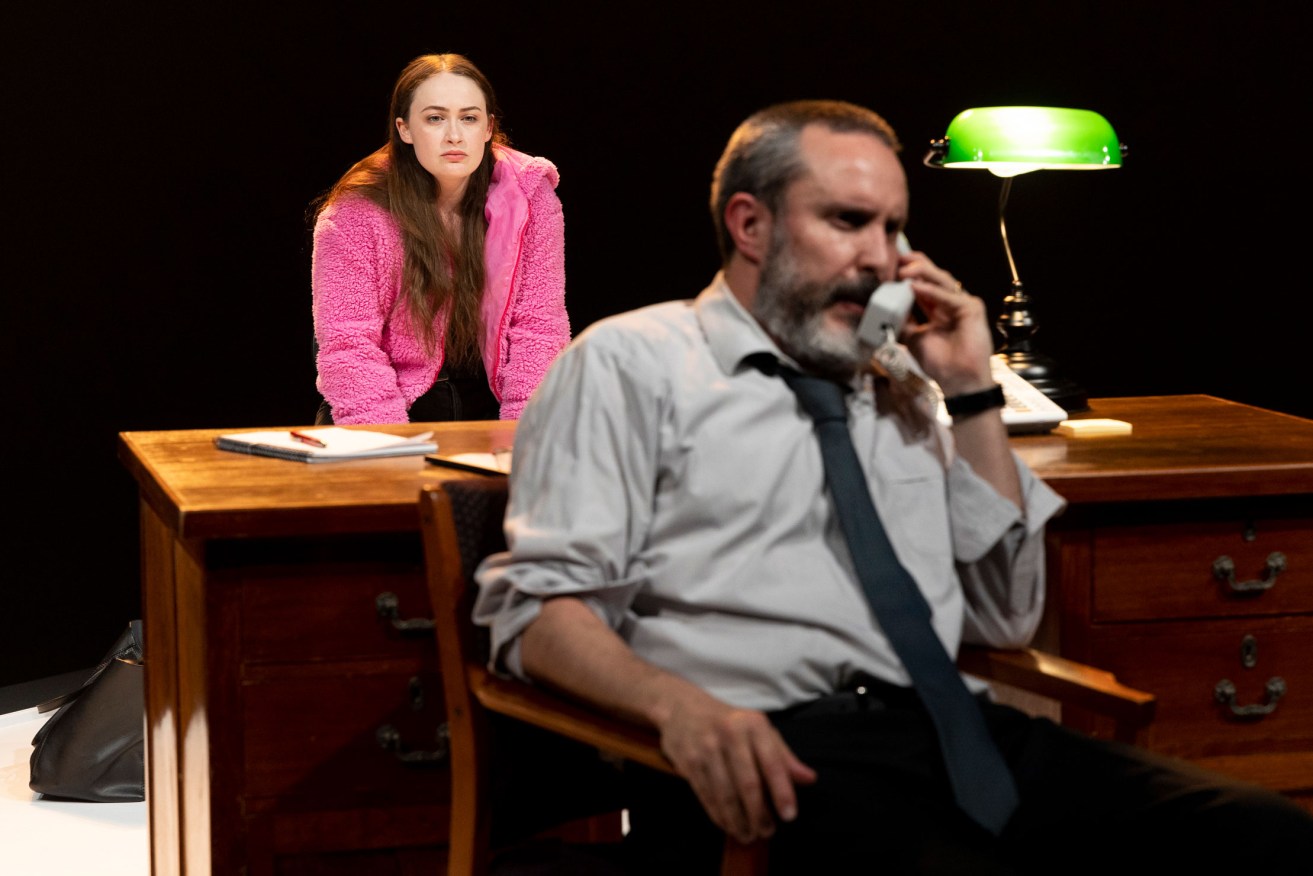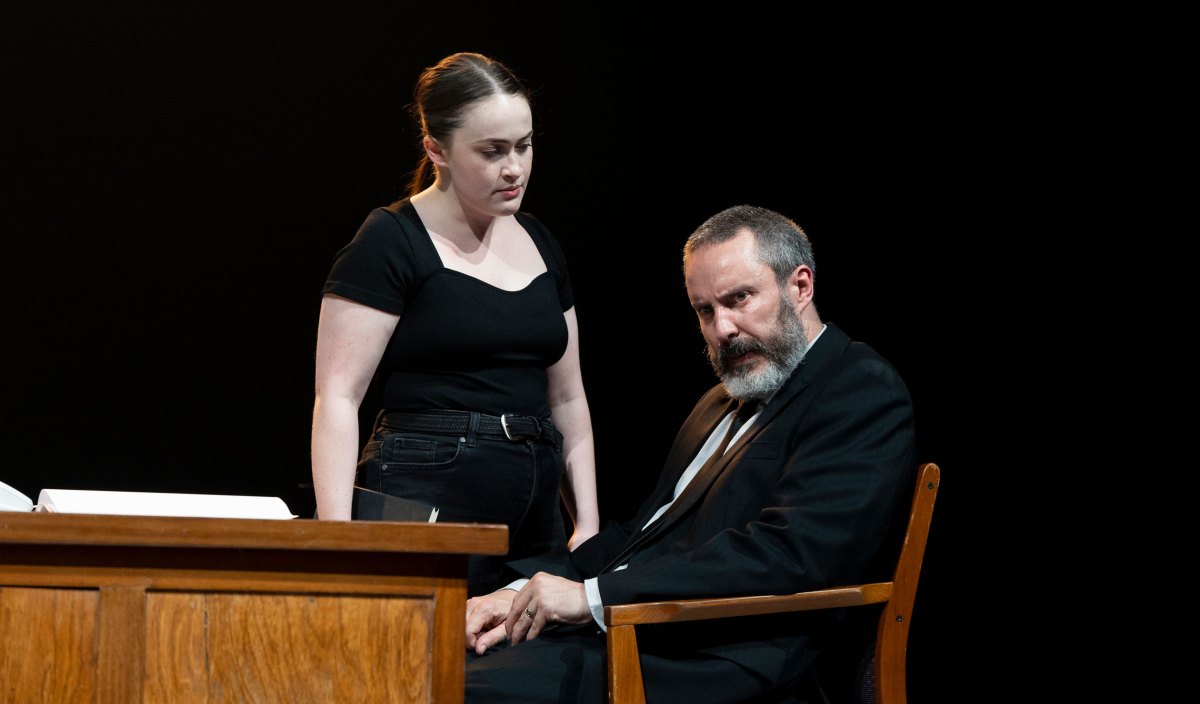Theatre review: Oleanna
Flying Penguins revive a provocative and unsettling Mamet masterpiece, boldly tackling a pre-#MeToo questioning of power and privilege in a post-#MeToo world.


Georgia Laity and Renato Musolino in Flying Penguin Productions' 'Oleanna'. Photo: Shane Reid
An undergraduate student meets with a university professor about her grades. She’s struggling with his class. He’s on the cusp of winning tenure. They are alone in his office.
A closed-door meeting between a man and a woman with a significant power differential at play? As a post-#MeToo audience, we think we know the score. But like any David Mamet play, we are on unstable ground, with the very nature of truth up for debate.
After the success of Glengarry Glen Ross in 2021, Flying Penguin Productions clearly has a penchant for the challenges presented by Mamet’s works. Written in 1992, this provocative two-hander, directed by David Mealor, would have been confronting 30 years ago. Now, in the light of Harvey Weinstein’s rape convictions, audiences sit down well-versed on issues of consent and the abuse of power.
Given this shift in public insight into power dynamics, Mamet’s rapid-fire dialogue and complex layering of misinterpretations possibly say something quite different today to the playwright’s original intent. But that’s the challenge of a Mamet play. Nuanced, complicated and subjective, the only thing guaranteed is that every audience member will leave the theatre unsettled, provoked and with a completely individual perspective on what transpired.
From the opening lines, we are thrust into a maelstrom of miscommunication. Act one lays out the problematic interaction, both characters immediately at cross-purposes. Carol (Georgia Laity) is lacking in confidence and overwrought, convinced the course material is beyond her understanding. John (Renato Musolino) tries to sooth her, intellectually and physically, promising her better grades if she comes back for private sessions. He preens and lectures, while she questions and takes notes.
In the second act, the play hits its stride. Power lurches one way, then the other. Carol has made a complaint to the tenure committee. For John, it’s a matter of a student misunderstanding his intent and weaponising political correctness. As a teacher, he claims it’s his role to provoke. From Carol’s perspective, John is a walking example of unconscious entitlement, oblivious to his privilege and the power he wields over her.
As the drama escalates towards the shocking climax, both characters are blind to their faults, yet convinced of their righteousness. The audience is in constant flux – in a situation where every word and gesture is judged and contested, who is in the right?

Clever set design and costuming help to illustrate the changing power dynamic between student and teacher in Oleanna. Photo: Shane Reid
Musolino is simply brilliant as the aggrieved professor, perfectly embodying the paternalistic educator, blind to his language of microaggressions and subtle gaslighting. Laity hits her stride in the second act, channelling Carol’s self-righteous anger more naturally than tearful anxiety.
At its heart, this play is an examination of power, privilege and language, and while much of this work is achieved through the script, Mealor brilliantly signals the ever-fluid balance of power using stage position, costuming and the actors’ body language.
Kathryn Sproul’s clever set design and costuming speak volumes. Through the simple change in stage orientation of a desk and two chairs, we see the power gradient flatten, the pair moving from educator and student to man and woman. The costuming telegraphs Carol’s growing confidence and John’s battle to arrest his slipping reputation. Yet even these observations are open to interpretation. Personally, I read Carol’s attire in the second act as signalling a growth in confidence and manifest anger, yet after the play, I overhead an audience member remark her costume demonstrated a provocative attempt to seduce the professor.
This is captivating theatre – unsettling and slippery – forcing us to examine our own biases. And while public perspectives have shifted since 1992, Oleanna touches on contemporary hot-button issues – sexual harassment, cancel culture, consent – in a way that demands we not only examine each situation on its merits, but examine the prejudices and biases within ourselves.
Oleanna is playing at the Space Theatre, Adelaide Festival Centre, until November 26.




